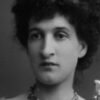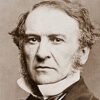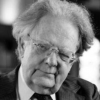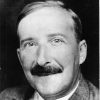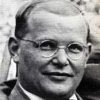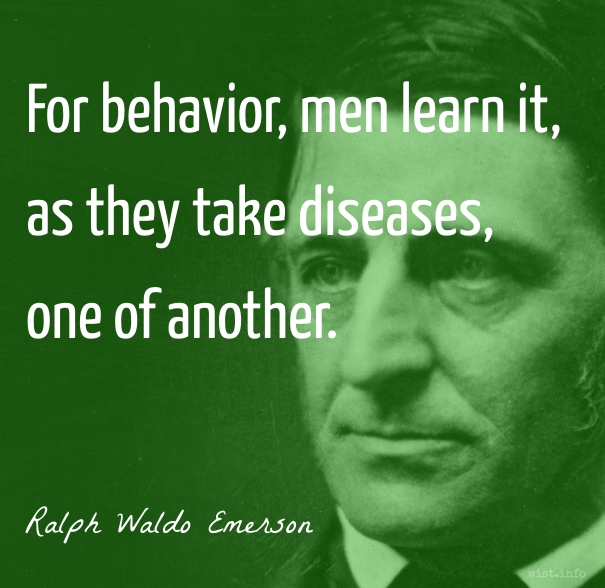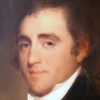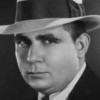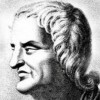Endeavour rather to get the Approbation of a few good Men, than the Huzza of the Mob.
Thomas Fuller (1654-1734) English physician, preacher, aphorist, writer
Introductio ad Prudentiam, Vol. 1, # 512 (1725)
(Source)
Quotations about:
mob
Note not all quotations have been tagged, so Search may find additional quotes on this topic.
The man of firm and righteous will,
No rabble, clamorous for the wrong,
No tyrant’s brow, whose frown may kill,
Can shake the strength that makes him strong.[Iustum et tenacem propositi virum
non civium ardor prava iubentium,
non voltus instantis tyranni
mente quatit solida]Horace (65-8 BC) Roman poet and satirist [Quintus Horacius Flaccus]
Odes [Carmina], Book 3, # 3, l. 1ff (3.3.1-4) (23 BC) [tr. Conington (1872)]
(Source)
(Source (Latin)). Alternate translations:An honest and resolved man,
Neither a peoples tumults can,
Neither a Tyrants indignation,
Un-center from his fast foundation.
[tr. Fanshaw; ed. Brome (1666)]Not the rage of the people pressing to hurtful measures, not the aspect of a threatening tyrant can shake from his settled purpose the man who is just and determined in his resolution.
[tr. Smart/Buckley (1853)]He that is just, and firm of will
Doth not before the fury quake
Of mobs that instigate to ill,
Nor hath the tyrant's menace skill
His fixed resolve to shake.
[tr. Martin (1864)]Not the rage of the million commanding things evil,
Not the doom frowning near in the brows of the tyrant,
Shakes the upright and resolute man
In his solid completeness of soul.
[tr. Bulwer-Lytton (1870)]Neither the fury of the populace, commanding him to do what is wrong, nor the face of the despot which confronts him, [...] shakes from his solid resolve a just and determined man.
[tr. Elgood (1893)]The just man, in his purpose strong,
No madding crowd can bend to wrong.
The forceful tyrant's brow and word,
[...] His firm-set spirit cannot move.
[tr. Gladstone (1894)]Him who is just, and stands to his purpose true.
Not the unruly ardour of citizens
Shall shake from his firm resolution,
Nor visage of the oppressing tyrant.
[tr. Phelps (1897)]The upright man holding his purpose fast,
No heat of citizens enjoining wrongful acts,
No overbearing despot's countenance,
Shakes from his firm-set mind.
[tr. Garnsey (1907)]The man that's just and resolute of mood
No craze of people's perverse vote can shake,
Nor frown of threat'ning monarch make
To quit a purposed good.
[tr. Marshall (1908)]The man tenacious of his purpose in a righteous cause is not shaken from his firm resolve by the frenzy of his fellow citizens bidding what is wrong, not by the face of threatening tyrant.
[tr. Bennett (Loeb) (1912)]Who loves the Right, whose will is resolute,
His purpose naught can shake — nor rage of brute
Mob bidding him work evil; nor the eye
Of threatening despot
[tr. Mills (1924)]A mob of citizens clamouring for injustice,
An autocrat's grimace of rage [...] cannot stagger
The just and steady-purposed man.
[tr. Michie (1963)]The man who knows what's right and is tenacious
In the knowledge of what he knows cannot be shaken.
Not by people righteously impassioned
In a wrong cause, and not by menacings
Of tyrants' frowns.
[tr. Ferry (1997)]The just man, tenacious in his resolve,
will not be shaken from his settled purpose
by the frenzy of his fellow citizens
imposing that evil be done,
or by the frown of a threatening tyrant.
[tr. Alexander (1999)]The passion of the public, demanding what
is wrong, never shakes the man of just and firm
intention, from his settled purpose,
nor the tyrant’s threatening face.
[tr. Kline (2015)]Neither the passion of citizens demanding crooked things,
Not the face of a threatening tyrant
Shakes the man who is righteous and set in purpose
From his strong mind.
[tr. Wikisource (2021)]
To Virtue shame is all unknown;
She shines with honours of her own;
Nor, as the public smile or frown,
Takes office up, or lays it down.[Virtus, repulsae nescia sordidae,
intaminatis fulget honoribus
nec sumit aut ponit securis
arbitrio popularis aurae.]Horace (65-8 BC) Roman poet and satirist [Quintus Horacius Flaccus]
Odes [Carmina], Book 3, # 2, l. 17ff (3.2.17-20) (23 BC) [tr. Gladstone (1894)]
(Source)
The bundle of rods, sometimes encircling an axe, is known as the fasces, and was the symbol of government power in Rome. The reference to the axe (securis) is from this symbol.
(Source (Latin)). Alternate translations:Vertue, that ne're repulse admits,
In taintless honours, glorious sits,
Nor takes, or leaveth Dignities,
Rais'd with the noise of vulgar cries.
[tr. Sir T. H.; ed. Brome (1666)]Vertue, unlearn'd to bear the base
And shameful baffle of disgrace,
Nor takes, nor quits the tottering Throne,
As fickle Crowds shall smile or frown;
Nor from their wavering Breath receives the place.
[tr. Creech (1684)]True Virtue never knows defeat:
Her robes she keeps unsullied still,
Nor takes, nor quits, her curule seat
To please a people's veering will.
[tr. Conington (1872)]Virtue, unknowing of base repulse, shines with immaculate honors; nor does she assume nor lay aside the ensigns of her dignity, at the veering of the popular air.
[tr. Smart/Buckley (1853)]Worth, all-indifferent to the spurns
Of vulgar souls profane,
The honours wears, it proudly earns,
Unclouded by a stain:
Nor grasps, nor lays the fasces down,
As fickle mobs may smile or frown.
[tr. Martin (1864)]Virtue ne'er knows of a defeat which brings with it disgrace;
The blazon of her honors ne’er the breath of men can stain;
Her fasces she nor takes nor quits
As veers the popular gale.
[tr. Bulwer-Lytton (1870)]Virtue knows not base rejection, is radiant with the purest honour, and neither takes, nor resigns, the axes at the breath of the popular will.
[tr. Elgood (1893)]Virtue, that knows not how to be overthrown,
Shines with unsullied honours impregnable.
Nor at the lawless people's bidding
Does she take up or lay down her honours.
[tr. Phelps (1897)]Virtue that knows not base defeat
Shines with untarnished honours,
Nor takes nor lays aside the Consul's axe
Upon decision by the popular whim.
[tr. Garnsey (1907)]True Worth knows not defeat, and still preserves
His robe unsullied by base Envy's stain;
He takes not nor quits power again,
As mob-mood sways and swerves.
[tr. Marshall (1908)]True worth, that never knows ignoble defeat, shines with undimmed glory, nor takes up nor lays aside the axes at the fickle mob’s behest.
[tr. Bennett (Loeb) (1912)]Virtue, secure from shameful rout,
With honours all-unstained shines out;
Nor takes, nor drops, authority
To suit the crowd's oft-changing cry.
[tr. Mills (1924)]Unconscious of mere loss of votes and shining
With honours that the mob's breath cannot dim,
True worth is not found raising or resigning
The fasces at the wind of popular whim.
[tr. Michie (1963)]Virtue has no concern with reputation,
Shines for its own sake, neither takes up
Arms nor lays them down
Because the mob tells it so.
[tr. Raffel (1983)]Virtue, rejecting everything that's sordid,
Shines with unblemished honor, nor takes up office
Nor puts it down persuaded by any shift
Of the popular wind.
[tr. Ferry (1997)]Virtue, unconscious of disgraceful defeat,
shines with unsullied honors
nor does she raise up or lay down the Fasces
at the mere murmuring of the mob.
[tr. Willett (1998)]Virtue, that’s ignorant of sordid defeat,
shines out with its honour unstained, and never
takes up the axes or puts them down
at the request of a changeable mob.
[tr. Kline (2015)]Courage, unaware of putrid defeat,
gleams with unblemished honours,
and neither takes nor places the axes
on the judgement of the common ear.
[tr. Wikisource (2021)]
A celebrity is one who is known to many persons he is glad he doesn’t know.
H. L. Mencken (1880-1956) American writer and journalist [Henry Lewis Mencken]
A Little Book in C Major, ch. 5, § 5 (1916)
(Source)
Variants:CELEBRITY. One who is known to many persons he is glad he doesn't know.
[A Book of Burlesques, "The Jazz Webster" (1924)]A celebrity is one who is known to many persons he is glad he doesn’t know.
[Chrestomathy, ch. 30 "Sententiae" (1949)]
No solitary miscreant, scarcely any solitary maniac, would venture on such actions and imaginations, as large communities of sane men have, in such circumstances, entertained as sound wisdom.
Thomas Carlyle (1795-1881) Scottish essayist and historian
“Signs of the Times,” Edinburgh Review No. 98, Art. 7 (1829-06)
(Source)
As, when in tumults rise th’ ignoble crowd,
Mad are their motions, and their tongues are loud;
And stones and brands in rattling volleys fly,
And all the rustic arms that fury can supply.[Ac veluti magno in populo cum saepe coorta est
seditio, saevitque animis ignobile volgus,
iamque faces et saxa volant — furor arma ministrat ….]Virgil (70-19 BC) Roman poet [b. Publius Vergilius Maro; also Vergil]
The Aeneid [Ænē̆is], Book 1, l. 148ff (1.148-150) (29-19 BC) [tr. Dryden (1697)]
(Source)
(Source (Latin)). Alternate translations:As oft when a great people mutinie
Ignoble vulgar rage; stones, firebrands flye,
Furie finds arms.
[tr. Ogilby (1649)]And as when a sedition has perchance arisen among a mighty multitude, and the minds of the ignoble vulgar rage; now firebrands, now stones fly; fury supplies them with arms.
[tr. Davidson/Buckley (1854)]As when sedition oft has stirred
In some great town the vulgar herd,
And brands and stones already fly --
For rage has weapons always nigh ....
[tr. Conington (1866)]As when
Sedition in a multitude has risen,
And the base mob is raging with fierce minds,
And stones and firebrands fly, and fury lends
Arms to the populace ...
[tr. Cranch (1872), l. 187ff]Even as when oft in a throng of people strife hath risen, and the base multitude rage in their minds, and now brands and stones are flying; madness lends arms.
[tr. Mackail (1885)]And, like as mid a people great full often will arise
Huge riot, and all the low-born herd to utter anger flies,
And sticks and stones are in the air, and fury arms doth find ....
[tr. Morris (1900)]As when in mighty multitudes bursts out
Sedition, and the wrathful rabble rave;
Rage finds them arms; stones, firebrands fly about ....
[tr. Taylor (1907), st. 21, l. 181ff]As when, with not unwonted tumult, roars
in some vast city a rebellious mob,
and base-born passions in its bosom burn,
till rocks and blazing torches fill the air
(rage never lacks for arms) ....
[tr. Williams (1910)]And as, when oft-times in a great nation tumult has risen, the base rabble rage angrily, and now brands and stones fly, madness lending arms ....
[tr. Fairclough (1916)]Sometimes, in a great nation, there are riots
With the rabble out of hand, and firebrands fly
And cobblestones; whatever they lay their hands on
Is a weapon for their fury.
[tr. Humphries (1951)]Just as so often it happens, when a crowd collects, and violence
Brews up, and the mass mind boils nastily over, and the next thing
Firebrands and brickbats are flying (hysteria soon finds a missile) ....
[tr. Day-Lewis (1952)]And just as, often, when a crowd or people
is rocked by a rebellion, and the rabble
rage in their minds, and firebrands and stones
fly fast -- for fury finds its weapons ....
[tr. Mandelbaum (1971), l. 209ff]When rioting breaks out in a great city,
And the rampaging rabble goes so far
That stones fly, and incendiary brands --
For anger can supply that kind of weapon ....
[tr. Fitzgerald (1981)]As when disorder arises among the people of a great city and the common mob riuns riot, wild passion finds weapons for men's hands and torches and rocks start flying ....
[tr. West (1990)]As often, when rebellion breaks out in a great nation,
and the common rabble rage with passion, and soon stones
and fiery torches fly (frenzy supplying weapons) ....
[tr. Kline (2002)]Riots will often break out in the crowded assembly
When the rabble are roused. Torches and stones
Are soon flying -- Fury always finds weapons.
[tr. Lombardo (2005)]Just as, all too often,
some huge crowd is seized by a vast uprising,
the rabble runs amok, all slaves to passion,
rocks, firebrands flying. Rage finds them arms.
[tr. Fagles (2006)]Just as riots often fester in great crowds when the common mob goes mad; rocks and firebrands fly, the weapons rage supplies.
[tr. Bartsch (2021)]
From the happy expression on their faces you might have supposed that they welcomed the war. I have met with men who loved stamps, and stones, and snakes, but I could not imagine any man loving war.
Margot Asquith (1864-1945) British socialite, author, wit [Emma Margaret Asquith, Countess Oxford and Asquith; Margot Oxford; née Tennant]
Autobiography, Vol. 2, 3 Aug 1914 (1922)
(Source)
Of the cheering crowds outside 10 Downing Street on 3 Aug 1914, the night before the British Government (with her husband as Prime Minister) declared war against Germany.
The principle of Toryism is mistrust of the people, qualified by fear; the principle of Liberalism is trust in the people, qualified by prudence.
William Gladstone (1809-1898) English Liberal politician, Prime Minister (1868-74, 1880-85, 1886, 1892-94)
Inscription on bust, National Liberal Club, London
(Source)
This quotation, or versions of it, are certainly associated to Gladstone, but with enough variants to make concrete attribution difficult. Sometimes given with "Conservatism" substituted for "Toryism." Sometimes quoted in the opposite order. Some renditions use "tempered" rather than "qualified" for one or the other clause, e.g.,:Liberalism is trust of the people, tempered by prudence; Conservatism, distrust of the people, tempered by fear.The principle of Liberalism is trust in the people, qualified by prudence. The principle of Conservatism is mistrust of the people qualified by fear.One party is influenced by trust of the people tempered by prudence, the other by distrust of the people tempered by fear.
The phrase has been attributed to speeches given in Oxford and Chester and in disparate dates from 1866, to 1872, to 1877. It is altogether likely he used different variations at multiple times. Two uses where I could find decent citations:I think that the principle of the Conservative Party is jealousy of liberty and of the people, only qualified by fear; but I think the principle of the Liberal Party is trust in the people, only qualified by prudence.
[Speech, Opening of the Palmerston Club, Oxford (Dec 1878)][His policy of] trust in the people, tempered by prudence, and averse to violent and hasty change.
[Manifesto to the Electors of South-West Lancashire (1866)]
Free yourself from common foolishness. This requires a special sort of sanity. Common foolishness is authorized by custom, and some people who resisted the ignorance of individuals were unable to resist that of the multitude.
[Librarse de las necedades comunes. Es cordura bien especial. Están muy validas por lo introducido, y algunos, que no se rindieron a la ignorancia particular, no supieron escaparse de la común.]
Baltasar Gracián y Morales (1601-1658) Spanish Jesuit priest, writer, philosopher
The Art of Worldly Wisdom [Oráculo Manual y Arte de Prudencia], § 209 (1647) [tr. Maurer (1992)]
(Source)
(Source (Spanish)). Alternate translations:Not to imitate the folly of others is an effect of rare wisedome; for whatever is introduced by example and custome, is of great force. Some who have guarded against particular ignorance, have not been able to avoid the general.
[Flesher ed. (1685)]Keep yourself free from common Follies. This is a special stroke of policy. They are of special power because they are general, so that many who would not be led away by any individual folly cannot escape the universal failing.
[tr. Jacobs (1892)]To keep free from the popular inanities, marks especially good sense. They are highly esteemed because so well introduced, and many a man who could not be trapped by some particular stupidity could not except the general.
[tr. Fischer (1937)]
Thinking is difficult, therefore let the herd pronounce judgment!
Carl Jung (1875-1961) Swiss psychologist
Flying Saucers: A Modern Myth of Things Seen in the Skies, ch. 2 (1959) [tr. Hull]
(Source)
The motto of the "relatively unconscious man" who "clings to the commonplace, the obvious, the probable, the collectively valid." Reprinted in the The Collected Works of C.G. Jung - Civilization in Transition, vol. 10, ¶ 653.
Probable source of the frequently-attributed (but unfound) "Thinking is difficult. That's why most people judge."
There’s something in all of us that wants to drift toward a mob, where we can all say the same thing without having to think about it, because everybody is all alike except people that we can hate or persecute. Every time we use words, we’re either fighting against this tendency or giving in to it. When we fight against it, we’re taking the side of genuine and permanent human civilization.
Northrop Frye (1912-1991) Canadian literary critic and literary theorist
The Educated Imagination, Talk 6 “The Vocation of Eloquence” (1963)
(Source)
There can be no free speech in a mob: free speech is one thing a mob can’t stand.
Northrop Frye (1912-1991) Canadian literary critic and literary theorist
The Educated Imagination, Talk 6 “The Vocation of Eloquence” (1963)
(Source)
It is in vain to Say that Democracy is less vain, less proud, less selfish, less ambitious or less avaricious than Aristocracy or Monarchy. It is not true in Fact and no where appears in history. Those Passions are the same in all Men under all forms of Simple Government, and when unchecked, produce the same Effects of Fraud Violence and Cruelty. When clear Prospects are opened before Vanity, Pride, Avarice or Ambition, for their easy gratification, it is hard for the most considerate Phylosophers and the most conscientious Moralists to resist the temptation. Individuals have conquered themselves, Nations and large Bodies of Men, never.
John Adams (1735-1826) American lawyer, Founding Father, statesman, US President (1797-1801)
Letter to John Taylor (17 Dec 1814)
(Source)
The true democratic principle, that none shall have power over the people, is taken to mean that none shall be able to restrain or to elude its power. The true democratic principle, that the people shall not be made to do what it does not like, is taken to mean that it shall never be required to tolerate what it does not like. The true democratic principle, that every man’s free will shall be as unfettered as possible, is taken to mean that the free will of the collective people shall be fettered in nothing.
John Dalberg, Lord Acton (1834-1902) British historian, politician, writer
“Review of Sir Erskine May’s Democracy in Europe,” The Quarterly Review (1878-01)
(Source)
It always demands a far greater degree of courage for an individual to oppose an organized movement than to let himself be carried along with the stream — individual courage, that is, a variety of courage that is dying out in these times of progressive organization and mechanization. During the war practically the only courage I ran across was mass courage, the courage that comes of being one of a herd, and anyone who examines this phenomenon more closely will find it to be compounded of some very strange elements: a great deal of vanity, a great deal of fear — yes, fear of staying behind, fear of being sneered at fear of independent action, and fear, above all, of taking up a stand against the mass enthusiasm of one’s fellows.
ORESTES: A terrible thing is the mob, whenever it has villains to lead it.
PYLADES: But with honest leaders its counsels are always honest.[Ὀρέστης: δεινὸν οἱ πολλοί, κακούργους ὅταν ἔχωσι προστάτας.
Πυλάδης: ἀλλ᾽ ὅταν χρηστοὺς λάβωσι, χρηστὰ βουλεύουσ᾽ ἀεί.]Euripides (485?-406? BC) Greek tragic dramatist
Orestes, ll. 772-773 [Orestes] (408 BC) [tr. Coleridge (1938)]
(Source)
Original Greek. Alt. trans.:ORESTES: Ah, my friend! When mobs have rotten leaders they are likely to do all sorts of nasty things.
PYLADES: It's a very different story when their leaders are wise, though ....
[tr. Theodoridis (2010)]ORESTES: The mob is frightening when their leaders are criminal.
PYLADES: But when they have good one, their decisions are good.
[tr. Luschnig (2013)]ORESTES:
The mob is nasty, when it has leaders
bent on doing wrong.
PYLADES:
But when it’s controlled
by decent men, the decisions they make
are always good.
[tr. Johnston (2020), ll. 938-940]The masses are terrible whenever they have scoundrels as leaders.
[tr. @sententiq (2020)]
A mixture of gullibility and cynicism had been an outstanding characteristic of mob mentality before it became an everyday phenomenon of masses. In an ever-changing, incomprehensible, world the masses had reached the point where they would, at the same time, believe everything and nothing, think that everything is possible and that nothing was true. The mixture in itself was remarkable enough, because it spelled the end of the illusion that gullibility was a weakness of unsuspecting primitive souls and cynicism the vice of superior and refined minds.
Hannah Arendt (1906-1975) German-American philosopher, political theorist
The Origins of Totalitarianism, Part 3, ch. 11 “The Totalitarian Movement,” sec. 2 (1951)
(Source)
Was none who would be foremost
To lead such dire attack;
But those behind cried “Forward!”
And those before cried “Back!”Thomas Babington Macaulay (1800-1859) English writer and politician
“Horatius,” st. 50, Lays of Ancient Rome (1842)
(Source)
If we must die, let it not be like hogs
Hunted and penned in an inglorious spot,
While round us bark the mad and hungry dogs,
Making their mock at our accursed lot.Claude McKay (1889-1948) Jamaican-American writer, poet, journalist
“If We Must Die,” The Liberator (Jul 1919)
(Source)
When I put a question to him about socialism in agriculture, he explained with glee how he had incited the poorer peasants against the richer ones, “and they soon hanged them from the nearest tree — ha! ha! ha!” His guffaw at the thought of those massacred made my blood run cold.
It is common to assume that human progress affects everyone — that even the dullest man, in these bright days, knows more than any man of, say, the Eighteenth Century, and is far more civilized. This assumption is quite erroneous. The men of the educated minority, no doubt, know more than their predecessors, and some of them, perhaps, it may be said that they are more civilized — though I should not like to be put to giving names — but the great masses of men, even in this inspired republic, are precisely where the mob was at the dawn of history. They are ignorant, they are dishonest, they are cowardly, they are ignoble. They know little if anything that is worth knowing, and there is not the slightest sign of a natural desire among them to increase their knowledge.
H. L. Mencken (1880-1956) American writer and journalist [Henry Lewis Mencken]
“Homo Neandertalensis,” Baltimore Evening Sun (29 Jun 1925)
(Source)
As democracy is perfected, the office [of the President] represents, more and more closely, the inner soul of the people. We move toward a lofty ideal. On some great and glorious day the plain folks of the land will reach their heart’s desire at last, and the White House will be adorned by a downright moron.
H. L. Mencken (1880-1956) American writer and journalist [Henry Lewis Mencken]
“Bayard vs. Lionheart,” The Baltimore Evening Sun (26 Jul 1920)
Variant: "As democracy is perfected, the office of the President represents, more and more closely, the inner soul of the people. On some great and glorious day, the plain folks of the land will reach their heart's desire at last, and the White House will be occupied by a downright fool and a complete narcissistic moron."
Verification and discussion of this quotation here, here, and here.
Yet at this very point it becomes quite clear that only an act of liberation, not instruction, can overcome stupidity. Here we must come to terms with the fact that in most cases a genuine internal liberation becomes possible only when external liberation has preceded it. Until then we must abandon all attempts to convince the stupid person. This state of affairs explains why in such circumstances our attempts to know what “the people” really think are in vain and why, under these circumstances, this question is so irrelevant for the person who is thinking and acting responsibly.
Dietrich Bonhoeffer (1906-1945) German Lutheran pastor, theologian, martyr
“On Stupidity” (1942)
(Source)
There is also this: when we renounce the self and become part of a compact whole, we not only renounce personal advantage but are also rid of personal responsibility. There is no telling to what extremes of cruelty and ruthlessness a man will go when he is freed from the fears, hesitations, doubts and the vague stirrings of decency that go with individual judgement. When we lose our individual independence in the corporateness of a mass movement, we find a new freedom — freedom to hate, bully, lie, torture, murder and betray without shame and remorse. Herein undoubtedly lies part of the attractiveness of a mass movement.
Eric Hoffer (1902-1983) American writer, philosopher, longshoreman
True Believer: Thoughts on the Nature of Mass Movements, Part 3, ch. 14, § 77 (1951)
(Source)
Glorious men are the scorn of wise men, the admiration of fools, the idols of parasites, and the slaves of their own vaunts.
Francis Bacon (1561-1626) English philosopher, scientist, author, statesman
“Of Vain-Glory,” Essays, No. 54 (1625)
(Source)
I do not say that Democracy has been more pernicious, on the whole, and in the long run, than Monarchy or Aristocracy. Democracy has never been and never can be so durable as Aristocracy or Monarchy. But while it lasts it is more bloody than either. […] Remember Democracy never lasts long. It soon wastes exhausts and murders itself. There never was a Democracy Yet, that did not commit suicide.
John Adams (1735-1826) American lawyer, Founding Father, statesman, US President (1797-1801)
Letter to John Taylor (17 Dec 1814)
(Source)
For behavior, men learn it, as they take diseases, one of another.
Ralph Waldo Emerson (1803-1882) American essayist, lecturer, poet
“Solitude and Society,” Atlantic Monthly (1857-12)
Paraphrase of Shakespeare, King Henry IV, Part 2, Act 5, sc. 1: "It is certain that either wife bearing or ignorant carriage is caught, as men take diseases, one of another: therefore let men take heed of their company." Sometimes misattributed to Francis Bacon.
I know your race. It is made up of sheep. It is governed by minorities, seldom or never by majorities. It suppresses its feelings and its beliefs and follows the handful that makes the most noise. Sometimes the noisy handful is right, sometimes wrong; but no matter, the crowd follows it. The vast majority of the race, whether savage or civilized, are secretly kind-hearted and shrink from inflicting pain, but in the presence of the aggressive and pitiless minority they don’t dare to assert themselves. Think of it! One kind-hearted creature spies upon another, and sees to it that he loyally helps in iniquities which revolt both of them. Speaking as an expert, I know that ninety-nine out of a hundred of your race were strongly against the killing of witches when that foolishness was first agitated by a handful of pious lunatics in the long ago. And I know that even to-day, after ages of transmitted prejudice and silly teaching, only one person in twenty puts any real heart into the harrying of a witch. And yet apparently everybody hates witches and wants them killed. Some day a handful will rise up on the other side and make the most noise — perhaps even a single daring man with a big voice and a determined front will do it — and in a week all the sheep will wheel and follow him, and witch-hunting will come to a sudden end.
Popular reason does not always know how to act right, nor does it always act right when it knows.
Fisher Ames (1758-1808) American politician, orator
“No Revolutionist,” The Palladium (Nov 1801)
(Source)
The intelligence of that creature known as a crowd is the square root of the number of people in it.
If forty million people say a foolish thing it does not become a wise one, but the wise man is foolish to give them the lie.
W. Somerset Maugham (1874-1965) English novelist and playwright [William Somerset Maugham]
A Writer’s Notebook (1949)
An entry dated 1901. More discussion about this quotation: If Fifty Million People Say a Foolish Thing, It Is Still a Foolish Thing – Quote Investigator
It is said public opinion will not bear it. Really? Public opinion, I am sorry to say, will bear a great deal of nonsense. There is scarce any absurdity so gross, whether in religion, politics, science, or manners, which it will not bear.
When the million applaud you, seriously ask yourself what harm you have done; when they censure you, what good!
Charles Caleb "C. C." Colton (1780-1832) English cleric, writer, aphorist
Lacon: Or, Many Things in Few Words, Vol. 1, § 183 (1820)
(Source)
It is bad to be oppressed by a minority, but it is worse to be oppressed by a majority. For there is a reserve of latent power in the masses which, if it is called into play, the minority can seldom resist.
John Dalberg, Lord Acton (1834-1902) British historian, politician, writer
Speech (1877-02-28), “The History of Freedom in Antiquity,” Bridgenorth Institute
(Source)
Everything is un-American that tends either to government by a plutocracy, or government by a mob. To divide along the lines of section or caste or creed is un-American. All privilege based on wealth, and all enmity to honest men merely because they are wealthy, are un-American — both of them equally so. Americanism means the virtues of courage, honor, justice, truth, sincerity, and hardihood — the virtues that made America. The things that will destroy America are prosperity-at-any-price, peace-at-any-price, safety-first instead of duty-first, the love of soft living, and the get-rich-quick theory of life.
The people that once bestowed commands, consulships, legions, and all else, now meddles no more and longs eagerly for just two things — bread and circuses!
[Nam qui dabat olim imperium, fasces, legiones, omnia, nunc se continet atque duas tantum res anxius optat, panem et circenses.]
Courage (in a soldier) is maintained by a certain anger; anger is a little blind and likes to strike out. And from this follows a thousand abuses, a thousand evils and misfortunes that are impossible to predict in an army during war.
Joseph Joubert (1754-1824) French moralist, philosopher, essayist, poet
Pensées [Thoughts], 1814 entry [tr. Auster (1983)]
(Source)
I could not find an analog in other translations of the Pensées.
The animosities of sovereigns are temporary, and may be allayed; but those which seize the whole body of people, and of a people too, dictate their own measures, produce calamities of long duration.
Thomas Jefferson (1743-1826) American political philosopher, polymath, statesman, US President (1801-09)
Letter (1786-05-06) to C. W. F. Dumas
(Source)
Mass movements can rise and spread without belief in a God, but never without belief in a devil.
Eric Hoffer (1902-1983) American writer, philosopher, longshoreman
True Believer: Thoughts on the Nature of Mass Movements, Part 3, ch. 15, § 65 (1951)
(Source)
For when many rejoice together, the joy of each one is richer: they warm themselves at each other’s flame.
[Quando enim cum multis gaudetur, et in singulis uberius est gaudium, quia fervefaciunt se et inflammantur ex alterutro.]
Augustine of Hippo (354-430) Christian church father, philosopher, saint [b. Aurelius Augustinus]
Confessions, Book 8, ch. 4 / ¶ 9 (8.4.9) [tr. Sheed (1943)] (c. AD 398)
(Source)
(Source (Latin)). Alternate translations:For when many joy together, each also has more exuberant joy for that they are kindled and inflamed one by the other.
[tr. Pusey (1838)]For when many rejoice together, each also has more exuberant joy; for that they are kindled and inflamed one by the other.
[ed. Shedd (1860)]For when many rejoice together, the joy of each one is the fuller in that they are incited and inflamed by one another.
[tr. Pilkington (1876)]For when many rejoice together, in each there is an overflowing joy, for they kindle themselves and are kindled by one another.
[tr. Hutchings (1890)]For, when joy is shared with many, the joy of each is richer, because they warm one another, catch fire from one another.
[tr. Bigg (1897)]For when many rejoice together the joy of each one is fuller, in that they warm one another, catch fire from each other.
[tr. Outler (1955)]For when many men rejoice together, there is a richer joy in each individual, since they enkindle themselves and they inflame one another.
[tr. Ryan (1960)]When large numbers of people share their joy in common, the happiness of each is greater because each adds fuel to the other’s flame.
[tr. Pine-Coffin (1961)]For when many people rejoice together, the joy of each individual is all the richer, since each one inflames the other and the warmth spreads throughout them all.
[tr. Warner (1963)]For when joy is shared with many, joy is fuller in each. They grow ardent and are fired each by the other.
[tr. Blaiklock (1983)]
These bare feet, these naked arms, these rags, these shades of ignorance, depths of despair, the gloom can be used for the conquest of the ideal. Look through the medium of the people, and you will discern the truth. This lowly sand that you trample underfoot, if you throw it into the furnace and let it melt and seethe, will become sparkling crystal; and thanks to such as this a Galileo and a Newton will discover the stars.
[Ces pieds nus, ces bras nus, ces haillons, ces ignorances, ces abjections, ces ténèbres, peuvent être employés à la conquête de l’idéal. Regardez à travers le peuple et vous apercevrez la vérité. Ce vil sable que vous foulez aux pieds, qu’on le jette dans la fournaise, qu’il y fonde et qu’il y bouillonne, il deviendra cristal splendide, et c’est grâce à lui que Galilée et Newton découvriront les astres.]
Victor Hugo (1802-1885) French writer
Les Misérables, Vol. 3 “Marius,” Book 1 “Paris in Microcosm,” ch. 12 “The Future Latent in the People” (1862) [tr. Wilbour/Fahnestock/MacAfee (1987)]
(Source)
The author speaking, criticizing philosophers and scholars who dismiss the common people, or "mob."
(Source (French)). Alternate translations:These bare feet, these naked arms, these rags, these shades of ignorance, these depths of abjectness, these abysses of gloom may be employed in the conquest of the ideal. This lowly sand which you trample beneath your feet, if you cast it into the furnace, and let it melt and seethe, shall become resplendent crystal, and by means of such as it a Galileo and a Newton shall discover stars.
[tr. Wilbour (1862)]These bare feet, these naked arms, these rags, this ignorance, this abjectness, this darkness, may be employed for the conquest of the ideal. Look through the people, and you will perceive the truth; the vile sand which you trample under foot, when cast into the furnace and melted, will become splendid crystal, and by its aid Galileo and Newton discover stars.
[tr. Wraxall (1862)]These bare feet, these bare arms, these rags, these ignorances, these abjectnesses, these darknesses, may be employed in the conquest of the ideal. Gaze past the people, and you will perceive truth. Let that vile sand which you trample under foot be cast into the furnace, let it melt and seethe there, it will become a splendid crystal, and it is thanks to it that Galileo and Newton will discover stars.
[tr. Hapgood (1887)]Those bare feet and arms, the rags, the ignorance, the abjection, the dark places, all may be enlisted in the service of the ideal. Peer through the heart of the people and you will discover the truth. The common sand that you tread underfoot, let it be cast into the furnace to boil and melt and it will become a crystal as splendid as that through which Galileo and Newton discovered the stars.
[tr. Denny (1976)]These bare feet, bare arms, rags, this benightedness, degradation, darkness may be used for the conquest of the ideal. Look through the populace and you will see the truth. This vile sand you trample underfoot -- let it be thrown into the furnace, let it melt and bubble there. It will turn into clear crystal, and it is thanks to this crystal that Galileo and newton will discover the stars.
[tr. Donougher (2013)]
I wish men to be free
As much from mobs as kings — from you as me.
No snowflake in an avalanche ever feels responsible.
[Żaden płatek śniegu nie czuje się odpowiedzialny za lawinę.]
Stanislaw Lec (1909-1966) Polish aphorist, poet, satirist
More Unkempt Thoughts [Myśli nieuczesane nowe] (1964) [tr. Gałązka (1969)]
(Source)
Alternate translation: "Each snowflake in an avalanche pleads not guilty."
More discussion of this quotation here: No Snowflake in an Avalanche Ever Feels Responsible – Quote Investigator.
When, however, the lay public rallies round an idea that is denounced by distinguished but elderly scientists and supports that idea with great fervor and emotion — the distinguished but elderly scientists are then, after all, probably right.
Isaac Asimov (1920-1992) Russian-American author, polymath, biochemist
Fantasy & Science Fiction (in answer to Clarke’s First Law) (1977)
See Clarke.






